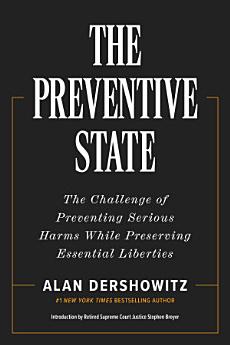The Preventive State: The Challenge of Preventing Serious Harms While Preserving Essential Liberties
About this ebook
—Stephen Breyer, Former Associate Justice of the Supreme Court
If reliable but uncertain intelligence predicted a mass casualty terrorist attack and indicated likely suspects,
what preventive actions would be constitutionally authorized? Detention? Interrogation? Torture? What if the attack involved a weaponized virus? Should the government compel widespread inoculation that might kill hundreds of people while saving millions? What if an article describing how to circumvent the inoculation mandate was about to be published? Should censorship of the article be authorized?
These are the sorts of questions Alan Dershowitz has been asking for more than 60 years, in his teaching, writing, and litigation. Now, at age 86, he has written his magnum opus. In it, he suggests an overarching jurisprudential framework that would set limits to the ballooning power of what he calls “the preventive state.”
This important book offers unprecedented insights into one of the most underexamined developments of our age: the growing magnitude and frequency of cataclysmic threats, coupled with the increasingly effective—but increasingly intrusive—tools intended to predict and prevent them.
Dershowitz responds to the urgent need for a jurisprudence that provides balance and accountability as both dangers and preventive capabilities increase, threatening our security and our liberties. This masterful analysis should be read by everyone who cares about security, liberty, and democracy.
About the author
ALAN DERSHOWITZ has been litigating, teaching, and writing about law and policy for more than 60 years. He has written 55 books and more than 1,000 articles. Many of today’s world leaders are among the 10,000 students he has taught. He has represented and advised presidents, prime ministers, and business leaders.
Called “the world’s best-known lawyer” and its most prominent defender of civil liberties, he has litigated and won hundreds of cases in multiple countries. He has received numerous honorary degrees, medals, and other honors for his work. One such distinction was bestowed on him by Nobel Peace Prize laureate Elie Wiesel who said: “If there had been a few people like Alan Dershowitz during the 1930s and 1940s, the history of European Jewry might have been different.”
Most of his cases and causes have been pro bono, including his defense of dissidents, such as Natan Sharansky, Václav Havel, and Julian Assange.
Dershowitz graduated first in his class at Yale Law School and was the editor-in-chief of the Yale Law Journal. He taught at Harvard for 50 years, where he offered courses on issues ranging from criminal, constitutional, family, and Jewish laws to psychiatry, neurobiology, mathematics, literature, philosophy, and even baseball. His primary academic interest has been on prediction and prevention of harmful conduct, which he developed into a course and taught during most of his career. Philosophically, he considers himself a constitutional libertarian, meritocratic egalitarian, and constructive contrarian.
At age 86, he continues to write and consult, while spending more time with Carolyn, his wife of 39 years, his three children, and two grandchildren.








